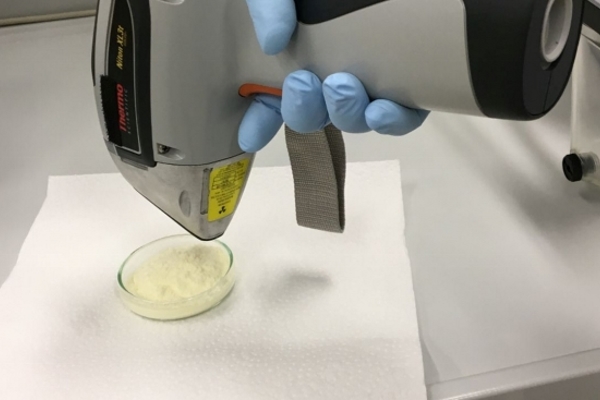
The battle to fight food fraud is getting a helping hand from the International Atomic Energy Agency in the form of a project to seek out a nuclear-based food-screening technology.
The research project, which is being run in collaboration with the Food and Agriculture Organization of the United Nations (FAO), brings together scientists from 13 countries – including China, India and the UK – to explore opportunities created by advances in field-deployable analytical equipment with the aim to enable countries to quickly detect food fraud and contamination through the use of low-cost, portable tools.
"The development of high performance hand-held computing devices, such as smartphones, has enabled a new generation of instruments that can be used outside the traditional laboratory environment," said Iain Darby, head of the Nuclear Science and Instrumentation Laboratory at the IAEA, an intergovernmental forum that works for the safe and peaceful use of nuclear science and technology.
For years, professional laboratories have been the sole source for detecting food fraud and contamination but for many countries, particularly those in the developing world where food fraud is rife, this professional capacity is often limited. To have a portable, low-cost tool that can be used in streets stalls and markets would have a large impact on cracking down on the illicit trade, which costs the global food industry between $10bn and $15bn every year, accounting for about 10 per cent of all commercially-sold food products.
A recent Interpol/Europol operation seized €230m-worth of counterfeit and adulterated food and beverages in more than 50,000 checks and raids, including bogus and substandard alcohol, mineral water, seasoning cubes, seafood and olive oil.
Portable tools and standard operating procedures will allow authorities to respond faster at critical checkpoints and protect the food supply chain from being inundated with tainted products and will also help provide proof for convictions, said Syahidah Muhammad, head of the Stable Isotope Laboratory at the University Sains Malaysia.
The project will oversee the development of methods for using hand-held devices to test food authenticity, including provenance and composition, along with the compilation of guidelines for analyses and the establishment of a comprehensive database of authentic reference samples.
Milk powder and vegetable oil will be the initial focus as the two commodities are among the most common food products to be the subject of food fraud.
"Labels and paperwork are what countries often depend on, and these can be forged. We need to rely on science to provide assurances," said project participant Jose Almirall, director of the International Forensic Research Institute at Florida International University.
Ion mobility spectrometry is one technology that is being considered as a potential food fraud weapon. This nuclear-based tech – that separates and identifies ionised molecules in the gas phase based on their mobility – is currently used by border police to detect illicit drugs and explosives but scientists say it could be adapted to perform point-of-use screening tests to check for adulterants, contaminants and mould in food.
The project is also benefiting from two portable spectrometer machines purchased thanks to a contribution from Germany to help modernise the Agency's nuclear sciences and applications laboratories.
Food fraud is becoming more high-profile, particularly in the wake of the 2013 horsemeat scandal in the UK and the outrage following the counterfeit milk scandal in China in 2008 when children died. Meanwhile an ongoing meat scandal in Brazil, where rotten meat was passed off as fresh alongside allegations of authorities being bribed to allow the activity, has put EU trade talks with the country in jeopardy.
In addition to the health and safety implications, the economic costs for legitimate food producers has led many to explore their technological options to secure the supply chain and ensure authenticity. Many countries are also seeking to tighten regulations in a bid to be seen to be clamping down on the illicit trade.
"We are always waiting for the next big scandal to happen, and hope that it will not have an impact on health," said Simon Kelly, a food safety specialist at the Joint FAO/IAEA Division of Nuclear Techniques in Food and Agriculture, who leads the project. "Authorities often find themselves under public pressure, while not being adequately equipped with screening technology that can stand up to the challenge of uncovering food fraud. We need to have easy-to-use methods in place."
Countries participating in the project include: Austria, Belgium, China, India, Malaysia, Morocco, Russian Federation, Singapore, Sri Lanka, Sweden, Uganda, the UK and the USA.
The first results are expected within the next two years.
©
SecuringIndustry.com





